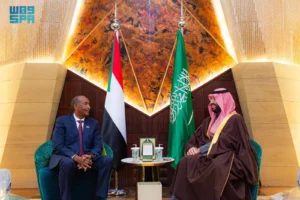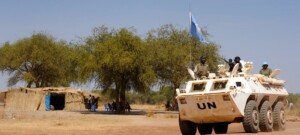Juba: Conflicting views on progress of Sudan peace talks
The government and the Sudan Revolutionary Front (SRF) confirmed that there is great progress in the ongoing peace talks in Juba the capital of South Sudan. The head of the Sudan Liberation Movement (SLM-MM), Minni Minawi, claims that there is a setback in the current negotiations.
 Juba peace talks (File photo)
Juba peace talks (File photo)
The government and the Sudan Revolutionary Front (SRF) confirmed that there is great progress in the ongoing peace talks in Juba the capital of South Sudan. Minni Minawi, head of the Sudan Liberation Movement (SLM-MM), claims that there is a setback in the current negotiations.
On Friday, Minawi reported a great setback in the peace talks regarding the Darfur track. He wrote on his Facebook account that “Without any shame, the government delegation repudiated all issues we agreed on. Unfortunately, that is what they have done repeatedly in the past”.
The chair of the movement’s negotiating delegation, Mohamed Abunumou stated that “we strikingly noticed changes and hardening of the government’s positions on issues that are deemed basic and simple.”
Abunumou told Dabanga Radio that the government’s positions made their previous optimism shrink and that they have become more cautious. “On the basis of the initial consultations and confidence-building arrangements, we hoped for a swift and better outcome for everyone,” he said.
“However, it is too early to judge the spirit of optimism to be dissipated, stressing that peace is a strategic goal for everyone and it cannot be reversed,” he added.
Land commission
In a press statement on Friday evening, the head of the South Sudanese mediation team, Tut Galuak explained that the negotiating parties decided to discuss the establishment of a land commission with legal experts to determine its mandate. “On Saturday, the negotiations will continue on the transitional justice paper,” he said.
On Friday afternoon, the government delegation headed by Mohamed El Taayshi and the SRF team for the Darfur track continued negotiations on power-sharing and land issues.
The negotiations made tangible progress in complicated issues related to power sharing and lands, El Taayshi stated. The land issues are complicated because they are associated with old conflicts and thus need further discussion. He added that there is a committee of experts working to develop a vision for power-sharing in Darfur. The parties will resume the talks within two days.
El Taayshi denied that the government delegation withdrew from any of the issues agreed upon, saying there has been no reason for the government delegation to back down. He expressed the government’s readiness to make concessions for the sake of peace.
He explained that the differences concerning the Darfur track are about the system of government, levels of governing, and reform of the civil service, he said. These issues have been transferred to a technical committee.
The government negotiator said that the delay in the discussion was caused by “objective differences and differing perceptions of certain issues”. He pointed out that there remains one point in the land issues that has been postponed for legal consultation. On Saturday, the two parties will begin negotiating the issues of justice and reconciliation.
In case the government sees it necessary to replace the current acting military governors, the appointments should be temporarily, until a peace agreement can be signed, he stated.
He said the vacuum and the dismantling of the ‘deep state’ necessitated the appointments in the civil service. He further explained that an agreement between the negotiating parties will determine this matter in the future.
El Sadig Adam, a member of Sudan’s Supreme Peace Council and a member of the government delegation, clarified that the transitional government did not back down from any previous agreements in the Darfur track, especially the framework agreement, and the protocol regarding the inclusion of stakeholders in the Juba peace talks. Friday’s session was about land issues.
'No conflicts'
On Friday, the government and the Sudan Revolutionary Front delegation held a press conference regarding the progress of the peace negotiations in Juba. In the press conference SRF chairman El Hadi Idris affirmed that the Juba negotiations on the Darfur track are proceeding as usual. He rebutted the existence of any delay or slowdown from any party regarding the ongoing peace talks. He said that there is a possibility of signing an agreement on the north Sudan track within the coming two days and the resumption of negotiations on the eastern Sudan track in the coming days.
El Hadi asserted that there is no conflict within SRF. However any party within the rebel alliance has the right to express his or her opinion. He further explained on a formal SRF statement that there are no differences between the negotiating parties that can hinder the ongoing peace process.
The negotiating parties are eager to reach a comprehensive peace agreement, he said. There are different views between the negotiating parties regarding the transitional period and the unification of the Darfur region as it was with its geographical borders. “Within a day and a half, the negotiations achieved great progress concerning land issues,” he said. “We expect a breakthrough in the coming days.”
El Hadi confirmed that the committee that formed by the government, the SRF and the UN-AU Mission in Darfur (Unamid) visited all camps in Darfur, except for three bases in South and East Darfur. He explained that all the displaced people in the camps have selected their representatives to participate in the conference that expected to be held soon. The discussion about the humanitarian issue will begin when the representatives of the displaced people arrive, he said.
Mohamed Bakheet, a member of the negotiating delegation of the Justice and Equality Movement, stated that the appointment of civilian governors and the legislative council violated the Juba Declaration. He stressed that SRF adheres to its negotiating position. “I hope we soon reach an agreement to avoid the need of appointing governors,” Bakheet said.
El Tahir Hajar, head of the Sudan Liberation Forces Alliance denied rumours that the disagreements are about the reintegration of the Rapid Support Force into the Sudanese armed forces. “The negotiating parties have not even started the security arrangements issue yet,” he said.
Radio Dabanga’s editorial independence means that we can continue to provide factual updates about political developments to Sudanese and international actors, educate people about how to avoid outbreaks of infectious diseases, and provide a window to the world for those in all corners of Sudan. Support Radio Dabanga for as little as €2.50, the equivalent of a cup of coffee.












 and then
and then